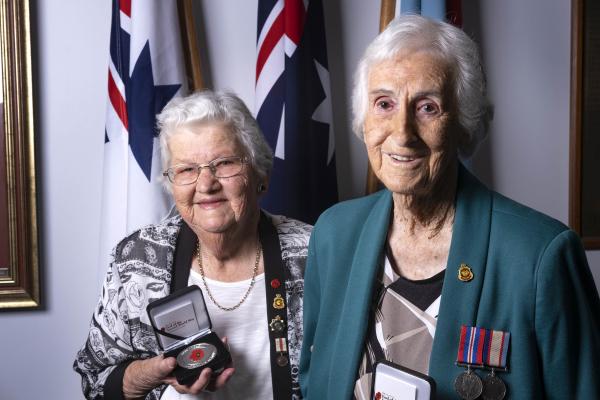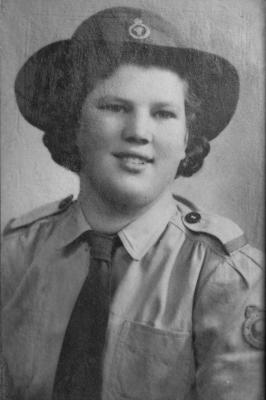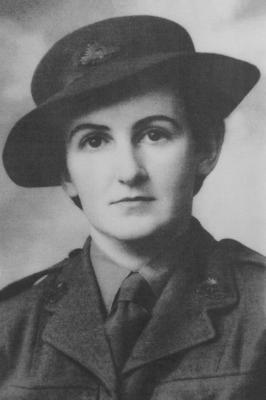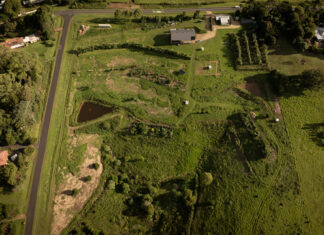Elsie Dalzell was 21 in 1942 when she signed up for the Australian Women’s Army Service (AWAS) and just five days short of her 99th birthday on 30 September was recognised with a certificate and commemorative medallion for her service in World War II.
Mrs Dalzell joined Joyce Cunningham last Friday at Cooroy RSL Sub-branch where Wide Bay MP Llew O’Brien presented them with commemorative medallions and certificates to honour their war service and mark the 75th anniversary of the end of the war.
After living all her life in Chinchilla Mrs Dalzell left for the first time in 1942 to travel by train to Brisbane and then on to Kapooka for training. She was assigned to The Australian Searchlight Unit of the 56 Battery Royal Australian Engineers in Brisbane and later transferred to Townsville where the unit kept their eyes on the skies for any planes overhead.
“I just thought things were getting that bad at the time I wanted to help,“ she said.
After the search light units were disbanded she worked in the School of Military Intelligence at Southport then the School of Tactics and Military Intelligence at Beenleigh and the staff school at Cabarlah as a switchboard operator before being discharged in 1946.
Mrs Cunningham was a year under the required age when at 17 she applied to join the Australian Women’s Land Army in 1943. Growing up on family dairy farms at Lake Cootharaba then Gympie she responded to advertisements at the time calling for women to work on farms to help plant and harvest crops to provide food for the population and the armed services.
“Three of my brothers joined the army and were sent to New Guinea,“ she said. “One of my brothers was awarded the Military Medal for his bravery. My sister also joined the Land Army.
“There weren’t many men around to work the land as a lot of men were away at the war fighting to keep our country free.“
Mrs Cunningham caught the steam train to the land office headquarters in Brisbane and was assigned to various regions needing farm workers.
She joined other land army girls, working hard on the land, sometimes sleeping in tents or billeting with farming families and working on all types of farms from crop growing to dairies to cattle and pig producers.
From a base at Glen Aplin she was sent to work on a small crops farm growing beans, peas, potatoes and tomatoes before moving to another farm in Gympie that grew paw paws and beans.
“I can remember all of these tomato plants – about 7000 of them, so we were kept busy picking, planting and chipping on the farm,“ she said. “The paw paw trees on the farm grew on the steep hills. We had to pic the fruit into four gallon tins and carry them to the packing shed to be packed and sent to markets. We did all sorts of jobs on this farm. While I was there I helped to build a well.“
There were a large number of Italian prisoners of was who also worked on the farms around Glen Aplin. One farm she worked on employed two Italian prisoners of war.
“They were both very nice fellows,“ she said.
At one land army camp at Aratula Mrs Cunningham walked alongside 15 girls under the supervision of a matron. They pulled up carrots, turnips, beetroot, picked tomatoes and picked potatoes by day and enjoyed each others company.
“We all got along very well together and we used to have some great sing songs at night time or go to the pictures at Kalbar. On our days off we used to go up to Cunninghams Gap and go for walks in the mountains,“ she said.
Mrs Cunningham said she enjoyed her time in The Australian Land Army even though it was hard work and they were away from their family and friends. The saying is hard work never hurts you , so I don’t suppose it really does.
“The government of the day didn’t recognise The Australian Women’s Land Army although the girls and women had to do men’s work on the farms to grow and harvest the food to sustain the armed forces,“ she said. “To celebrate 50 years of The Australian Women’s Land Army the government advised that any land army girl or woman could apply for a citizen’s medal and join the RSL, then a few years ago the government advised they were celebrating 70 years of The Australian Land Army by making available a special brooch.“
Mr O’Brien said it was a great honour to present the medallions and certificates to people whose efforts in the war made Australia the great country we are so lucky to live in today.
Wide Bay servicemen and women were well represented amongst the almost one million Australians who served in World War II and the medallions were an acknowledgement of the sacrifices made by this remarkable generation of Australians,” he said.
“She worked hard on the land, sometimes while sleeping in tents or billeting with a local family, doing hard yakka like picking beans, tomatoes, turnips and potatoes, milking cows and feeding pigs, and driving tractors at farms between here in Wide Bay and Stanthorpe.
Mr O’Brien said around 12,000 veterans who served during the Second World War were still living today, and it was important to seize the opportunity as a nation to publicly acknowledge and honour their service.
Second World War veterans, or their families on their behalf, can apply online at dva.gov.au/medallion or by phone on 02 61918217 during business hours.










